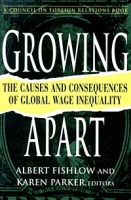| Growing Apart: The Causes and Consequences of Global Wage Inequality артикул 13636c. |
 |
Although the dollar value of international trade in goods and services is dwarfed by that of cross-border capital flows, trade over time has had a significantly greater effect on the lives of ordinary individuals in the United States and around the world Those who seek to protect U S domestic markets, such as Pat Buchanan and Ross Perot, cite trade's ожбыг role in creating "winners" and "losers" in the U S economy As the number of "losers"--including manufacturing laborers displaced by cheap foreign laboras well as firms in industries (such as steel) threatened by cheap imports--grows, so does the chorus for protection of domestic industries Without such protection, so the logic goes, the wages of workers in these industries either have to fall to compete with foreign workers or be eliminated altogether through layoffs This important book joins the debate with a robust defense of the principle--and practice--of free trade in the United States Editors Albert Fishlow and Karen Parker have collected essays from a number of leading economists and trade specialists, including David Blanchflower, Richard Freeman, J Bradford Jensen, Mark Krikorian, Lisa Lynch, Matthew Slaughter, and Kenneth Troske, that challenge the view that trade is solely responsible for growing inequality in the United States The authors debunk the generalized notion that protectionism will reverse inequality, elucidating the complexity of a problem of income distribution that includes other key factors such as technological progress, foreign direct investment, immigration, and expanded higher education. Андрей КивиновISBN 0876092555. |